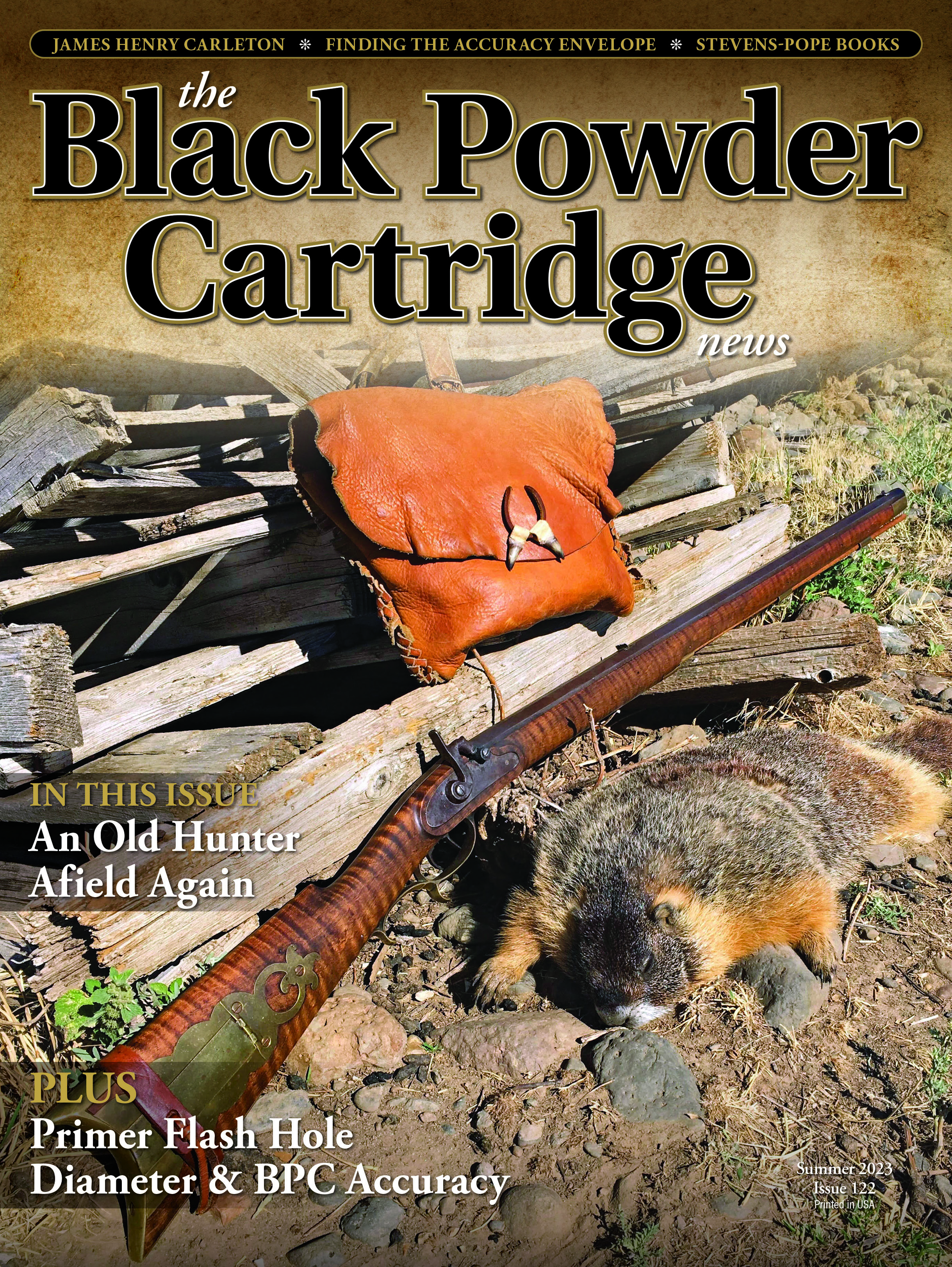The Black Powder Cartridge News Summer 2023
On the Cover: A restored .30 Ames Bown & Son caplock muzzloader.
Volume , Number Summer | ISSN:
Article Bites
From the Editor
Enjoy Life
column by: Steve Garbe
I think that you would have to been living under a pretty big rock to not have a life that was affected by COVID-19, either directly or indirectly. For many people, COVID was the defining event in their life, all things being either “pre-COVID” or “post-COVID. As we look upon the whole COVID epidemic from the position of hindsight, several things become very clear. ...Read More >
About the Cover
column by: Steve Garbe
There is probably nothing more satisfying to the lover of old firearms than when a vintage firearm is restored back to usefulness. I say this as a rifleman, who believes that careful restoration does not affect the overall worth of a firearm, but enhances it. I know there are collectors who will be aghast at such a statement, but I firmly believe that firearms are functional art forms and when they cease to function as they were intended, then they are simply conversation pieces. I like to shoot my rifles and take care of them rather than watch them slowly rust away in a collection. But that’s just me. ...Read More >
Letters from Readers
Primers For Black Powder
column by: Staff
I saw the letter by Lars Heinzinger and the response by Steve Garbe on primers in The Black Powder Cartridge News, No. 121 (Spring 2023). I would like to direct your attention to the Speer Reloading Manual #14, Sixth Printing, (April 2013). I will risk oversimplifying 10 pages of written material, five tables, two sets of drawings of conformal transducer readouts and two pages of loading data; but in their tests, primers do not make that much difference. Powder make and type can matter more, in the 45-70. ...Read More >
Product Reviews
Montana Vintage Arms Muzzleloader Sight, BACO’s Swaged Bullets for Paper Patching, SPG Sales “Bear Grease” Patch and Bullet Lube
column by: Steve Garbe / Mike Nesbitt
We have become accustomed to Montana Vintage Arms (MVA) recognizing a need in our shooting sports and coming up with a product to fill that hole. The newest MVA offering is precisely that; a quality sight made to address the needs of the market. ...Read More >
The Wyoming Schuetzen Union’s “Center Shot”
Gleanings from Bannerman’s 1907 Catalogue
column by: Jim Foral
There has never been a better time than right now to be an American gun nut. We live in a time of product variety and quantity, and some reloading component shortages notwithstanding, supply. ...Read More >
Match Results
Single Shot Target Rifle Benchrest Match Carpenter, Wyoming – February 17, 2023; 22 BPCR Silhouette Match; 22 BPCR Silhouette Match
column by: Cody Smith / Staff
I am happy to report that Single Shot Target Rifle competition is alive and well at Smithmoor. Our annual three-day target match is over and I am still smiling at the success. The competition was fierce and the camaraderie was unbeatable. I hope everyone that shot had as much fun as I did. ...Read More >
Rifle Clubs
column by: Staff
Alaska Rifle Club: Contact Somerset jones at 907-688-6892 or cid1893@mtaonline.net; Arizona: Phoenix - Ben Avery Shooting Facility: Contact George Taylor at lhephurn@outlook.com. . . ...Read More >
Primer Flash Hole Diameter & Black-Powder Cartridge Accuracy
feature by: Rick Moritz
I was very careful to keep the drill bit aligned with the axis of the existing hole. I did not want to end up with oval, oblong, or egg-shaped holes while enlarging the hole. Running the drill at a relatively slow speed kept the bit from grabbing and resulted in a nice, clean hole. After completing seven holes, I held the pepper shaker lid up to the shop light to look for burrs. The new holes were uniform and round and would allow the black pepper to pass through with less resistance resulting in a bit spicier meal. ...Read More >
.31 Percussion/32 S&W Conversion
feature by: Mike Nesbitt
Looking back along the line of the original Colts, the Model 1849 Pocket revolvers have quite a history. Colt’s .31 Baby Dragoon was designed in late 1847. The .31-caliber Baby Dragoon had the square-backed trigger guard that was like the trigger guard on the Colt Walker and the first issue of the Dragoon, giving it a “look” that makes it stand out among other Colt pocket models. Another pocket revolver should be mentioned is the version of the Baby Dragoon that was ordered with a rounded trigger guard by the Wells Fargo company. That gun is referred to today as the “Wells Fargo Model,” although it is rather doubtful that Colt ever gave it such a name. In 1849, those pocket revolvers were updated and improved by adding the loading lever. There were, however, some other options and the original 1849 revolvers were made with barrels from 3 to 6 inches in length. ...Read More >
An Old Hunter Afield Again
feature by: Jim Bowen
This past March, I was working for my friend, Kirby Hoyt, who runs the gun shop known as “Vintage Doubles.” Kirby sells classic side-by-side shotguns, some of which were specifically proofed in the 1800s for black powder. He had me reseal the shop floor, which entailed moving his accumulation of stuff from one part of the floor to another, then back again. During this resealing job, a crusty, dusty percussion rifle came out from the stairwell into the light of day for the first time in who knows how long. ...Read More >
James Henry Carleton, Kit Carson and Order 15
feature by: Miles Gilbert
James Henry Carleton was born at the port of Lubec, Maine, the son of a shipmaster on December 27, 1814. The British were yet contesting hegemony over the young U.S. and during the War of 1812, British forces occupied most of Maine east of the Penobscot River. They burned our capital the year that Carleton was born. ...Read More >
Finding the Accuracy Envelope
feature by: Kim Steiner
I very much enjoyed the interesting article by Rick Moritz in The Black Powder Cartridge News No. 120 (Winter 2022). However, I hope I can provide some help with the answer to one of his questions, “How many shots does it take to identify a MOA rifle?” ...Read More >
Stevens-Pope 1901-1913, Vol. 1, 2 & 3
Warren Greatbatch & Tom Rowe
feature by: Leo J. Remiger
The three volumes of Stevens-Pope, 1901 to 1913, authored by Warren Greatbatch and Tom Rowe, is the second set of volumes narrating the history of H.M. Pope. The first was H.M. Pope-Hartford, 1887 to 1901 and detailed his early years. This second set details his years at Stevens Arms and Tool Company beginning in 1901, and Stevens continuing to make Stevens-Pope rifles up to about 1911. ...Read More >
A Sharps of My Own
feature by: Mike Moran
“Anticipation. Anticipa-yay-tion. It’s makin’ me wait.” For those of you who remember that commercial from the 1970s, I felt just like that young kid, waiting for what seemed an eternity for the ketchup to come out of the bottle so he could enjoy his hamburger, except I was waiting for my new gun to arrive. Finally, after almost 15 months, I received a call from the guy at the local gun store. “Your gun is here. This thing is a beast.” ...Read More >


